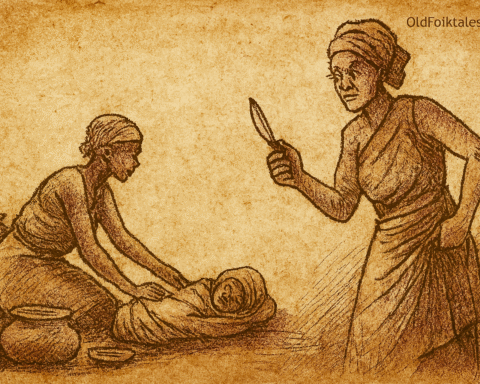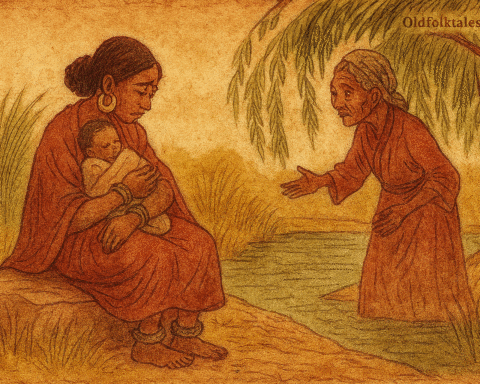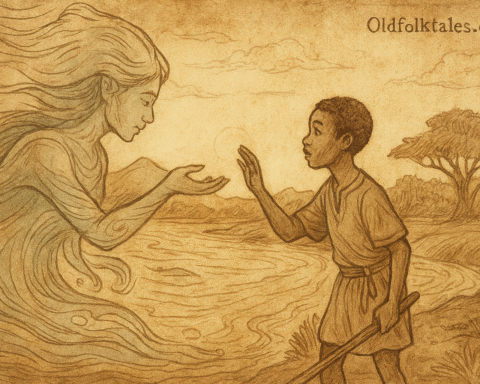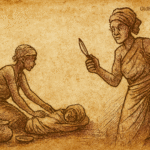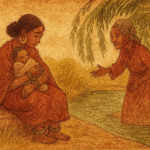Long ago in the rolling hills of what is now Zimbabwe, there was a village where rain fell only when the elders prayed and food came only after hard work in the fields. In this village lived a young girl named Nyasha, known for her kindness and her way of listening to the wind as if it whispered secrets. One day, as she fetched water from the river, she noticed an unusual tree standing alone at the edge of the forest. Its trunk was tall and golden in the sunlight, and its branches shimmered with leaves that seemed to glow even in the shade. Nyasha felt drawn to it, though no one in the village had ever mentioned such a tree.
She stepped closer, and to her astonishment, the tree spoke. “Nyasha,” it said in a gentle voice, “I am the Tree of Life. If you care for me, I will give your people food, water, and peace.” Nyasha promised to protect it, and from that day she visited the tree daily, watering its roots and clearing the weeds. Soon, golden fruits began to grow on its branches, each one heavy with sweetness and a single seed that sparkled like a star. When Nyasha brought the fruit back to the village, the elders were amazed. They tasted it and felt strength flow through their bodies.
Word spread quickly. The villagers came to the tree every morning, taking only what they needed. The rains returned, the fields flourished, and no one went hungry. The Tree of Life became a sacred place, and Nyasha its guardian. Yet, as with all good things, not everyone respected it. A man named Chipo, known for his greed, decided that if he could control the tree, he could become the richest man in the land.
One night, when the moon was thin and the wind was still, Chipo crept into the forest with a large sack. He filled it with more fruit than any one person could eat. The tree’s voice rumbled low. “Chipo, take only what you need, or you will lose all you have.” But Chipo laughed, thinking it was only the wind playing tricks. As he turned to leave, the golden fruits in his bag turned into heavy stones. His back bent under their weight, and his knees buckled.
The next morning, Nyasha found Chipo lying by the tree, exhausted and ashamed. She helped him stand, but the Tree of Life spoke again. “Greed poisons the gift I give. If your heart is not pure, my fruit will be nothing but burden.” Chipo dropped the stones and bowed his head, realizing his mistake. From that day, he worked alongside the others, taking only his share and helping Nyasha tend the tree.
Years passed, and the Tree of Life grew even taller, its branches wide enough to shade the whole village. Birds nested in its leaves, and animals came to drink from the pool of water at its roots. Nyasha grew older, her hair turning silver like the morning mist, but her smile remained as warm as the sun. One evening, as the sky burned with the colors of sunset, the tree called Nyasha for the last time.
“You have served well,” it said. “Now, I will give you my final gift.” A single golden fruit fell into her hands. She ate it slowly, feeling her strength return. The villagers watched as Nyasha closed her eyes and became part of the tree, her spirit flowing into its trunk. From that day, whenever the wind passed through the leaves, they swore they could hear her voice, reminding them to be kind, to share, and to care for the gifts of the earth.
The village continued to flourish for generations, for they remembered Nyasha’s lessons. They knew the Tree of Life was not just a source of food but a reminder that the earth gives generously when treated with respect. The children of the village would gather beneath its branches to hear the elders tell the story of the girl who loved a tree and saved her people. And when the rains came, they always thanked both Nyasha and the Tree of Life for the blessings they enjoyed.
Moral Lesson of The Magic Tree of Life
The Magic Tree of Life teaches us that generosity, respect, and balance are the roots of abundance. When we take only what we need and care for the gifts of nature, life will provide for us in return. However, greed turns blessings into burdens. The story reminds us that true wealth is found in sharing, community, and harmony with the earth.
Knowledge Check
- What is the main lesson from The Magic Tree of Life?
The main lesson is that generosity and respect for nature bring abundance, while greed turns blessings into burdens. - Who discovered the Magic Tree of Life in the story?
Nyasha, a kind-hearted young girl, discovered the Magic Tree of Life while fetching water from the river. - How did the Tree of Life reward Nyasha and her village?
It provided golden fruits that brought strength, rain for their fields, and peace to the community. - What happened when Chipo tried to take more fruit than he needed?
The fruits turned into heavy stones, teaching him that greed brings hardship instead of wealth. - How did Nyasha’s life end in the story?
She became one with the Tree of Life, and her spirit remained in its branches to guide the village. - Why is the Tree of Life considered sacred in the story?
It sustained the village with food, water, and lessons on harmony with nature, becoming a symbol of balance and gratitude.
Cultural Origin
Shona folktale, Zimbabwe

